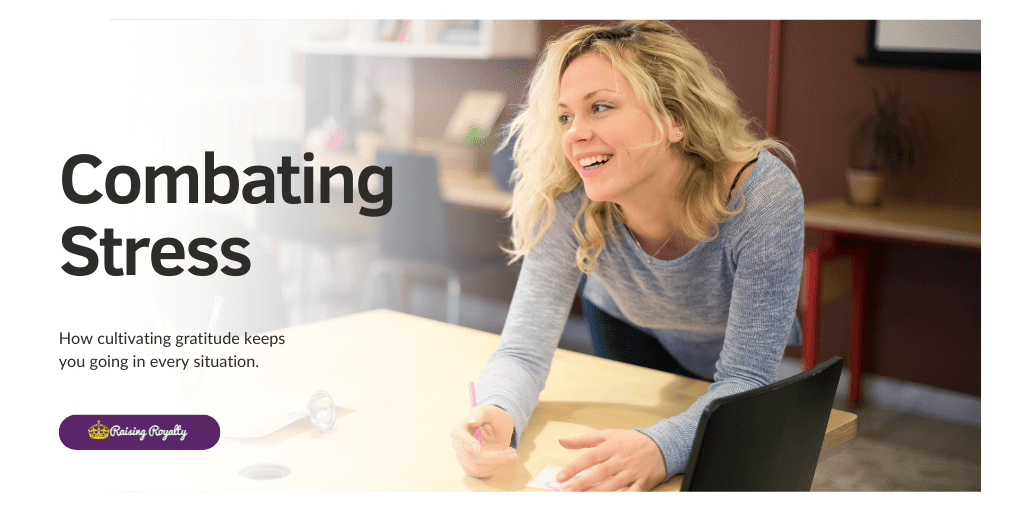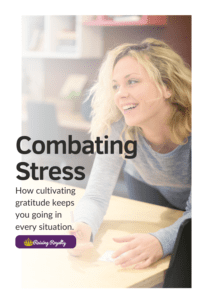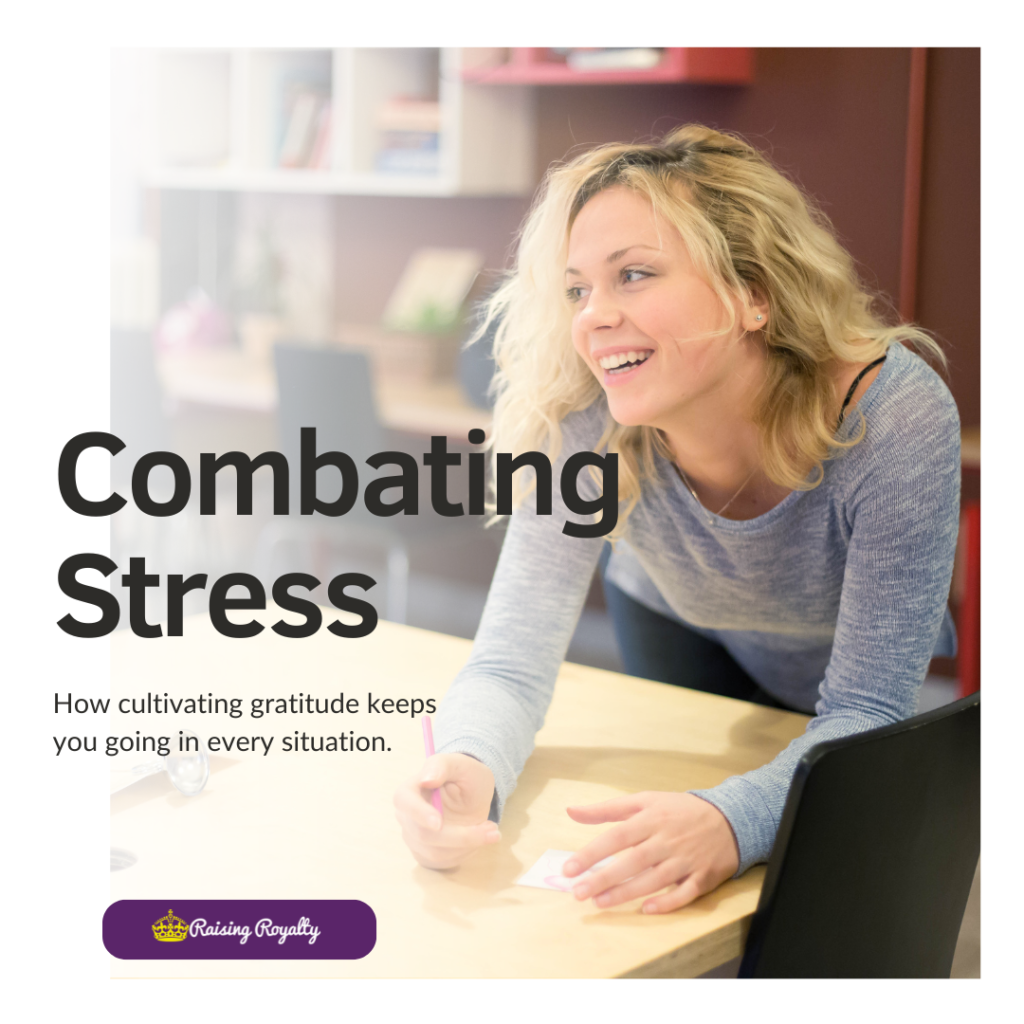
When you’re a mom, stress is just part of life. Being a single mom compounds that stress immensely. However, managing stress is crucial to our physical and mental health, and our ability to be a good parent. Choosing gratitude can help you manage your stress. And here are several gratitude tips for single moms on everything from why gratitude works to how to easily make gratitude part of your daily routines.
One of my key strategies to managing my stress levels is to practice gratitude. There are so many methods and benefits that there’s really no excuse to skip. Gratitude is an often overused buzzword, and some will avoid the phrase so that they aren’t caught up in mystical or self-help quick-fixes that make them uncomfortable. But we can miss out on some really helpful tools just because the presentation isn’t right.
So first, let’s look at why practicing gratitude can be so helpful. Then, I’ll share some of the methods I use to take advantage of all these benefits.
Regularly expressing gratitude improves your mental health.
Gratitude lowers stress, anxiety and depression.
Gratitude practices have been linked to lower levels of stress hormones, anxiety symptoms and lower use of depression medication. An improved mood helps us to be able to concentrate, make plans, and effectively parent. And feeling better about life in general just makes it easier to deal with the problems that do crop up.
Gratitude builds resilience.
Gratitude also helps build resilience – or the ability to cope with the unexpected – by shifting our focus. When we start looking at what we have with appreciation, we aren’t focused on what we don’t have. That attitude supports the determination we need when life gets difficult. And as moms, especially single moms, there are tons of challenges to navigate.
Gratitude creates optimism.
Practicing gratitude regularly encourages a more positive outlook on life. When we can recognize (and appreciate!) the shining lights that are there, even in the toughest of times, we can find hope. And hope leads to optimism, which means we’re more ready to jump on the opportunities that come our way.
Gratitude boosts self esteem.
Gratitude helps build our own self esteem. When we juggle multiple responsibilities, it’s important to recognize our own strengths. Give yourself a pat on the back, because, you’re actually doing a ton! As we acknowledge our own accomplishments, we build up our own mental strength to keep on and keep up the good work.
Choosing gratitude improves your relationships.
Gratitude builds connection.
No one likes to be around negative people. Toxic thinking is draining and just hard to live with. But we love spending time with people who appreciate us. So if we actively appreciate the support we get from our friends, family and community, we’re more likely to build stronger, and more meaningful, connections.
Gratitude Connects you to your network.
Having a strong community around us is valuable. That support network can help us access resources, find work, and even just have fun. Those increased feelings of happiness and satisfaction, brought on by gratitude, make us more fun to be around too.
Gratitude helps your parenting.
And as we’re grateful, and modeling that for our kids, we can be content in knowing that we’ve done what we can with what we have. This gratitude makes for happier moms, and that makes for happier kids. And if we can see that in the moment, we create a more positive atmosphere in our homes.
Gratitude keeps you in the moment.
Gratitude then helps us build that mindfulness and awareness of the present moment. Being more aware of what’s going on, and looking for the things to appreciate (because we’re being more positive in general) means that we’re better able to connect with our kids. And connection before correction is just good parenting!
Being more grateful improves your physical health.
Gratitude boosts your energy..
So how does gratitude impact your physical health? Well.. a more positive outlook and better mental health leads to lower blood pressure and a stronger immune system. So that means you’ll have more energy to manage that busy schedule. And you won’t be knocked out by every germ that your kids bring home, meaning less downtime and more time to work on things you want.
Gratitude improves your sleep.
Being grateful also improves your sleep quality. And that just makes sense, because when you notice, recognize and appreciate the things and people you have, your level of life satisfaction goes up – and your anxiety levels go down. Which in turn means you’re better able to fall asleep, and your sleep is deep, restful and (mostly) uninterrupted.
So how do I integrate gratitude into my daily life?
I start the day with gratitude.
When I wake up, I take a couple minutes just to deliberately notice and appreciate a few things: the softness of my bed, the sound of the birds outside my window, the fact that I have a warm (or cool) home and the quietness of my house before the kids get up. It’s not even verbal or complete thoughts, but rather a general part of waking up, for me. I take the time to notice, recognize, and appreciate a few small things, and it sets the tone for the day.
I make the effort to notice, recognize, and appreciate things throughout my day.
This habit is really a game changer, and it’ll lead to the next gratitude tip below. Before you can express gratitude, you have to actually notice the good things. Whether it’s the texture of your carpet beneath your feet, or the way the sun shines in the window, noticing the little things that make life better is how you start to express gratitude regularly. This mindfulness is key to gratitude – and all the benefits that come with.
I express gratitude to others.
Those two small words make a huge difference, not just for other people, but for myself as well. Saying thank you regularly and frequently is a habit I started when my kids were small, mostly because I wanted to model it for them. This is a foundational exercise for me, because over the years, this is where my habit of gratitude has built from. It can be a small thanks in passing for getting out of my way on the stairs, or a more heartfelt, deliberate expression of appreciation when my kids do something nice. But I make certain that I’m expressing gratitude to others every chance I get.
I keep a small journal of gratitude.
I don’t necessarily write in it every day, but I do write down regularly those things that I appreciate. It can be the simple pleasure of a cup of coffee, the silly moments I’ve had with my kids this week, or the act of kindness from a stranger at the grocery store. When I do sit down to write, I also look back at previous gratitude moments. Because that reflection on how good life can be helps when all I can see is doom and gloom.
I end my day with gratitude.
Some people call this prayer, some call it meditation, but it doesn’t matter if you label this practice or not. Before I go to bed, I take the time to look back on my day and just remember one or two things that I’m grateful for. I started this because I’d end my day with planning my next day’s tasks, but it would leave me worried, stressed or even excited about what was coming. And that didn’t make for very good sleeping. So while I still take a few moments at the end of my day to plan, I also include a few moments to look back and be thankful.
Cultivating gratitude isn’t a one-and-done activity.
It’s like cleaning, laundry, exercise, and taking a shower. It’s an ongoing process, with choices that need to be made over and over again. Gratitude is about training yourself to notice, recognize, and appreciate those things that make life bearable. It doesn’t have to be a big deal either, and you don’t need any expensive tools. Gratitude is a shift in your focus from the negative to the positive – and it can make a huge difference in your mental and physical health, and your relationships.


